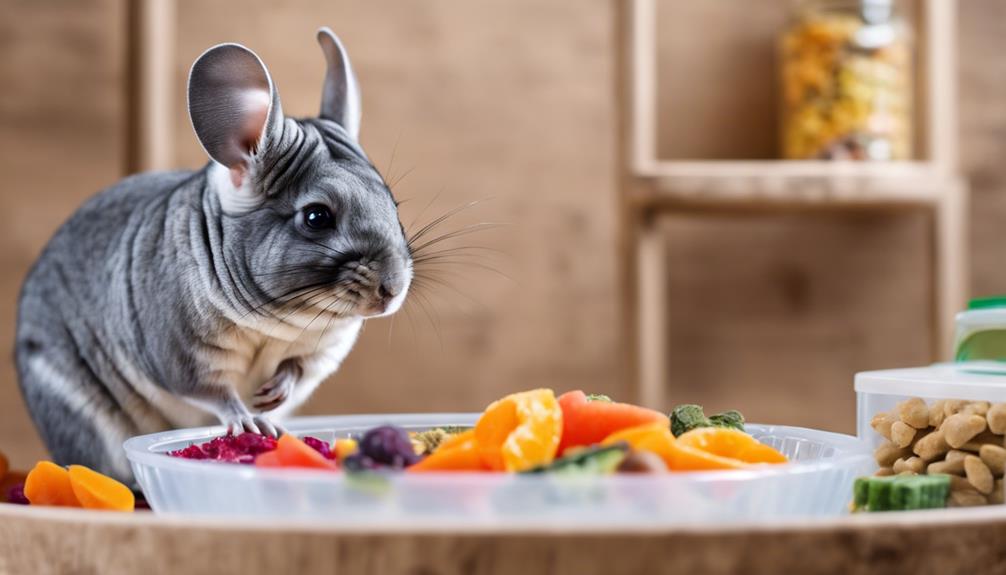When to Feed Your Chinchilla: Establishing a Healthy Routine

Chinchillas are crepuscular animals, meaning they are most active during dawn and dusk. Therefore, it is generally recommended to feed your chinchilla twice a day, once in the morning and once in the evening. This schedule aligns with their natural behavior and ensures they have a consistent supply of food throughout their active periods. Additionally, providing fresh hay and water at all times is essential for their health and well-being.
Establishing a regular feeding routine not only helps to keep your chinchilla healthy but also creates a sense of security and predictability for them. By feeding them at consistent times each day, you can help regulate their digestive system and prevent any potential issues related to irregular feeding schedules. Remember to monitor their food intake and adjust portions as needed based on their activity level and overall health.
Chinchilla Feeding Schedule
Establishing a consistent chinchilla feeding schedule is essential for maintaining your pet's health and well-being. Portion control and feeding frequency play critical roles in ensuring your chinchilla receives the appropriate nutrition without overindulging.
These adorable creatures have specific dietary preferences and mealtime behavior that should be taken into account when creating their feeding routine.
When it comes to portion control, chinchillas have delicate digestive systems that can be easily upset by sudden changes in diet or excessive food intake. It's recommended to provide measured amounts of specially formulated chinchilla pellets to meet their nutritional needs without causing digestive issues.
Regarding feeding frequency, offering food at consistent times each day helps regulate your chinchilla's metabolism and prevents them from becoming overweight. Observing their mealtime behavior can also give you insights into their preferences and appetite, allowing you to adjust their diet accordingly.
Importance of Consistency
Maintaining consistency in your chinchilla's feeding routine is paramount to their overall well-being. By adhering to a set timing for meals and establishing a regular feeding schedule, you provide stability and predictability for your furry friend.
This consistency not only fosters a sense of security but also helps regulate their digestive system for peak health.
Timing for Meals
Consistency in meal times is key to ensuring your chinchilla's health and well-being. To establish a harmonious feeding schedule, consider the following:
- Meal Frequency: Offer small portions multiple times a day to mimic their natural grazing behavior.
- Portion Sizes: Be mindful not to overfeed; provide appropriate portions to avoid health issues.
- Nighttime Feeding: Chinchillas are more active in the evening, making it an ideal time for a light snack.
- Morning Routine: Start the day with a nutritious meal to kickstart their metabolism and energy levels.
- Regularity: Stick to a set feeding schedule to create a sense of security and routine for your chinchilla.
Routine Feeding Schedule
Ensuring a regular feeding routine for your chinchilla is pivotal in fostering their overall health and contentment. Effort in feeding frequency and portion size is key to maintaining their well-being.
Chinchillas thrive on routine, so aim to feed them at the same times each day to establish a sense of security and predictability. By offering consistent portion sizes, you help regulate their dietary intake, preventing overeating or undereating.
Pay close attention to your chinchilla's mealtime behavior and appetite changes, as these could indicate underlying health issues. Remember, being attuned to your chinchilla's needs and maintaining a steady feeding schedule not only promotes physical health but also nurtures a harmonious bond between you and your furry companion.
Factors Affecting Feeding Times

Achieving a harmonious balance between your chinchilla's dietary needs and environmental factors can greatly impact their feeding times. When considering the factors affecting feeding times for your fluffy companion, keep in mind the following:
- Meal Frequency: Offering regular, consistent meals helps establish a routine for your chinchilla, aiding in digestion and overall well-being.
- Portion Control: Providing appropriate portion sizes guarantees your chinchilla receives the necessary nutrients without overeating.
- Temperature: Chinchillas are sensitive to heat, so feeding them during cooler parts of the day can prevent discomfort while eating.
- Noise Levels: Loud noises can startle chinchillas, affecting their appetite. Choose quieter feeding times to create a calm environment.
- Lighting: Chinchillas are crepuscular, being most active at dawn and dusk. Consider feeding them during these times to align with their natural behavior patterns.
Monitoring Food Intake
To maintain your chinchilla's health and well-being, vigilantly monitor its food intake to guarantee a balanced diet. Food portioning plays an essential role in keeping your furry friend healthy. Be mindful of the amount of food you provide daily, adjusting it based on your chinchilla's weight monitoring results. By keeping a watchful eye on feeding behavior, you can identify any changes that may indicate the need for dietary adjustments.
Chinchillas, like all creatures, have unique dietary needs. Observing their eating habits can provide valuable insights into their overall health. If you notice significant changes in how much they eat or any sudden weight fluctuations, it may be time to reassess their diet. Regular monitoring allows you to make timely adjustments to their food intake, guaranteeing they receive the nutrients necessary for their well-being.
Treats and Supplement Guidelines

Keep your chinchilla's diet balanced and healthy by following guidelines for treats and supplements that complement its nutritional needs. When it comes to treating your furry friend, opt for options that not only delight their taste buds but also provide essential nutrients. Here are some treat and supplement guidelines to keep in mind:
- Treat options: Choose treats such as dried fruits, herbs, or chinchilla-specific treats that are high in fiber and low in sugar to maintain your pet's health.
- Nutritional value: Make sure that the treats you offer are packed with vitamins and minerals to supplement your chinchilla's diet effectively.
- Supplement dosage: When considering supplements, always follow the recommended dosage to prevent any adverse effects on your chinchilla's well-being.
- Frequency: Moderation is key; offer treats and supplements sparingly to avoid disrupting the balance of your chinchilla's main diet.
- Variety: Rotate between different treat options to provide a diverse range of nutrients and prevent dietary monotony for your beloved chinchilla.
Adjusting to Your Chinchilla's Needs
Adjusting to your chinchilla's unique requirements involves keen observation and a willingness to adapt your care routine accordingly. Understanding your chinchilla's feeding habits is essential in ensuring their well-being. These adorable creatures have specific nutritional needs that must be met to keep them healthy and happy.
Chinchillas are herbivores with sensitive digestive systems. They thrive on a diet high in fiber and low in fat. Observing how your chinchilla interacts with their food can provide valuable insights into their preferences and appetite. Some chinchillas may be picky eaters, requiring a variety of hay, pellets, and fresh water to maintain a balanced diet.
Monitoring your chinchilla's weight and overall health is vital in adjusting their feeding regimen. If you notice any changes in their eating habits or energy levels, it may indicate a need for adjustments to their diet. Remember, each chinchilla is unique, so being attentive to their individual nutritional needs is key to ensuring their long-term health and happiness.
Consulting a Veterinarian

When it comes to the health and well-being of your cherished chinchilla, consulting a veterinarian is indispensable.
These professionals provide vital check-ups, offer expert advice on dietary requirements, and help establish a monitoring schedule to guarantee your pet stays in peak health.
Vet Check-Ups Essential
Ensuring regular veterinary check-ups for your chinchilla is imperative for maintaining its overall health and well-being. Here are five vital reasons why these check-ups are essential:
- Prevention: Regular check-ups can help catch any health issues early on.
- Expert Advice: Veterinarians can provide valuable guidance on dietary changes and overall care.
- Vaccinations: Your chinchilla may require vaccinations to stay protected.
- Parasite Control: Routine check-ups aid in preventing and treating parasites.
- Behavioral Concerns: Veterinarians can address any unusual behaviors and provide solutions for a harmonious relationship with your chinchilla.
Expert Diet Advice
For excellent chinchilla health, seek expert diet advice by consulting a veterinarian. Ensuring your chinchilla's diet maintains proper nutritional balance is important for their overall well-being. A veterinarian can provide tailored guidance on the best foods to include in their diet to meet their specific needs. They can also advise on portion sizes and frequency of feeding to prevent issues with digestive health.
When it comes to nutritional balance, chinchillas require a diet rich in high-quality hay, supplemented with pellets and occasional treats. Understanding the right proportions of each food group is essential to prevent digestive problems and maintain the best health for your furry friend.
Health Monitoring Schedule
Seeking guidance from a veterinarian is key to establishing a health monitoring schedule for your chinchilla. When consulting a professional, consider these essential aspects for your chinchilla's well-being:
- Regular Weigh-Ins: Keep track of your chinchilla's weight to monitor any fluctuations that could indicate health issues.
- Behavioral Observations: Note any sudden changes in behavior, such as increased lethargy or decreased appetite, as they could signal underlying problems.
- Dietary Adjustments: Consult with your vet to make sure your chinchilla's diet is meeting its nutritional needs for prime health.
- Environmental Checks: Make sure the chinchilla's habitat is suitable, with appropriate temperature, humidity, and cleanliness.
- Vaccination Schedule: Stay up-to-date with recommended vaccinations to prevent common illnesses.
Frequently Asked Questions
Can Chinchillas Be Trained to Eat at Specific Times or on a Schedule?
Can chinchillas be trained to eat at specific times or on a schedule? Consistency in training methods is key. While benefits include predictability and bonding, drawbacks may arise if schedules are disrupted. Remember, patience and routine are your allies.
How Do I Know if My Chinchilla Is Not Eating Enough or Is Overeating?
To maintain your chinchilla's health, monitor their weight management and practice portion control. Be alert to behavioral changes or appetite fluctuations, which may indicate insufficient or excessive eating. Stay attuned to your pet's needs for best well-being.
Are There Any Specific Foods or Treats That Can Help With Digestion or Dental Health?
For your chinchilla's digestive health and dental care, consider adding nutritional supplements like hay-based treats. These can aid in digestion and promote dental hygiene. Remember, a little treat now can prevent big problems later.
Should I Adjust My Chinchilla's Feeding Routine During Different Seasons or Weather Conditions?
Adjust your chinchilla's feeding routine based on seasonal changes and weather impact. Modify feeding frequency and schedule as needed to guarantee your furry friend's well-being and health throughout different conditions. Consistency is key.
What Are Some Common Signs That Indicate My Chinchilla May Have a Food Intolerance or Allergy?
When your chinchilla shows signs of discomfort like digestive upset, itchiness, or unusual behavior after eating, it may signal a food sensitivity. Adjust their diet by eliminating suspected culprits and consulting a vet for guidance.











